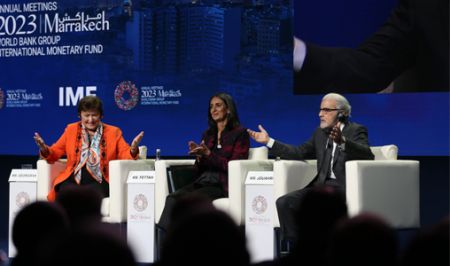“Morocco’s Quest for Stronger and Inclusive Growth” is the title of a book edited by Roberto Cardarelli and Taline Koranchelian of the International Monetary Fund (IMF), offering a comprehensive overview of the progress scored by Moroccan economy over recent decades.
The book, presented Monday at the start of the preparatory works of the WB/IMF Annual Meetings, taking place in Marrakech this October 9 through 15, also sheds light on the Kingdom’s forthcoming economic modernization program.
The presentation featured addresses by the Head of Government, Aziz Akhannouch, the Minister Delegate in charge of the Budget, Fouzi Lekjaa, and the Managing Director of the IMF, Kristalina Georgieva, who moderated a debate with Minister of Economy and Finance, Nadia Fettah, and the Wali of Bank Al-Maghrib, Abdellatif Jouahri.
The presentation, which was attended by a host of Moroccan and foreign personalities, including World Bank Group President Ajay Banga, provided an opportunity to shed light on the Moroccan experience, discuss its lessons for other countries, and highlight the Kingdom’s potential for private sector involvement, a key pillar of the country’s New Development Model program.
The book “Morocco’s quest for stronger and inclusive growth” is part of the “Road to Marrakech 2023” operation. It highlights the economic progress made by Morocco in recent decades, discusses the remaining challenges and the new structural reform agenda aimed at transforming the country’s development model, making it more inclusive and private sector-led.
Aziz Akhannouch underlined in his address the ambitious and proactive reforms undertaken over the past twenty years, noting that these reforms “have laid the foundations for a deep and lasting transformation of our economy, and have enabled the Kingdom to consolidate its resilience and preserve its macroeconomic balances.”
Stressing that “Morocco stands at a decisive crossroads in its history,” Akhannouch noted that this book illustrates the Kingdom’s determination to achieve ambitious goals in terms of economic and social development and to implement the far-sighted strategic vision initiated by the King, which outlines the ambitions, development objectives and levers of change likely to unleash energies and accelerate the country’s march towards progress and prosperity.
The Head of government who underlined the kingdom’s resolve to build a society based on solidarity and fairness, recalled the various reforms launched as of 2021 to strengthen institutional cohesion and social protection systems.
In this respect, he emphasized the importance of strengthening the healthcare system, improving the quality of the educational system and promoting scientific research and innovation, Morocco being convinced that growth must be inclusive, but also sustainable and respectful of the environment.
Akhannouch pointed out that the Kingdom, which is a forerunner in the development of renewable energies, is aiming to triple its installed capacity in wind and solar power, while seeking to position itself as a key player in the green hydrogen sector.
He also touched on the earthquake that hit central Morocco on September 8, pointing out that the emergency logistical and humanitarian measures put in place to address the disaster testify to the Kingdom’s strong resilience in the face of multiple crises.
He added that the reconstruction and economic and social development of the tremor-hit areas are structured within an ambitious, proactive, and integrated program aimed at rebuilding damaged homes, rehabilitating infrastructures, opening up territories, reducing social deficits and promoting local economic activity.
The authors of the book underline that over the past three decades, Morocco has made remarkable progress in terms of economic stability and development.
Morocco’s story offers valuable lessons for many developing countries still striving to build the foundations of their macroeconomic stability. The series of reforms the Kingdom has begun to implement can also serve as an inspiration for all countries wishing to strengthen their growth and make it more inclusive, they point out.
In the foreword, IMF Managing Director Kristalina Georgieva writes that this book explores the factors underlying Morocco’s resilience and points to the many reforms launched decades ago. These reforms include opening the country to international trade, investing in essential infrastructure, reducing untargeted subsidies, strengthening the independence of the Central Bank (Bank Al-Maghrib/BAM), developing a sound financial supervisory framework, and modernizing governance in both the public and private sectors.
For his part, the Head of Government, Aziz Akhannouch, points out in the Preface that this book highlights the achievements already made under the leadership of King Mohammed VI, without ignoring the scale of the challenges still ahead.
“By putting the Kingdom’s recent economic and social advances into perspective, this book bears witness to Africa’s rise to power,” he stresses in the preface.
